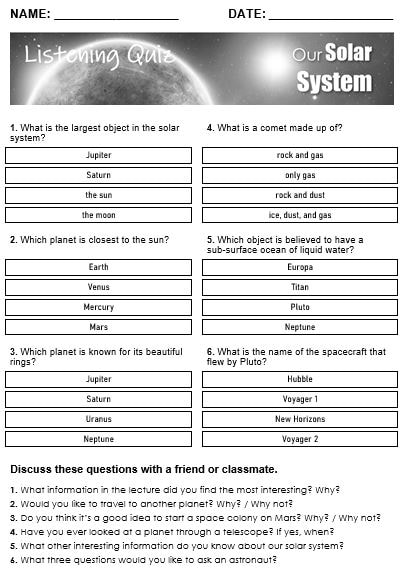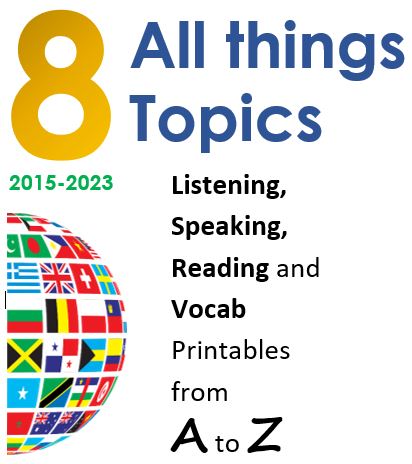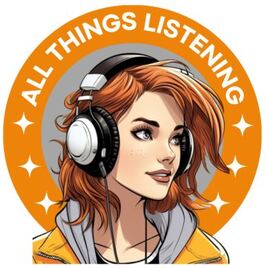Free printable PDF lesson plans, word banks, quizzes and games for EFL/ESL teachers
ADVANCED LISTENING PRACTICE
OUR SOLAR SYSTEM
OUR SOLAR SYSTEM
Audio Script
What exactly is our solar system? Our solar system is the collection of planets, moons, asteroids, and other celestial bodies that orbit around the sun. It is a vast and complex system that has fascinated astronomers and scientists for centuries.
The sun is at the center of the solar system and it is by far the largest object. It contains about 99.86% of the total mass of the solar system and it is the source of all the light and heat that sustains life on Earth. The eight planets in the solar system are Mercury, Venus, Earth, Mars, Jupiter, Saturn, Uranus, and Neptune. They range in size from the small and rocky Mercury to the massive gas giants like Jupiter and Saturn.
Each planet has unique characteristics and features. Mercury is the closest planet to the sun and has a rocky surface that is heavily cratered. Venus is similar in size to Earth and has a thick atmosphere that traps heat, making it the hottest planet in the solar system. Earth is the only planet known to have life and it has a diverse range of ecosystems and climates. Mars is known as the "Red Planet" because of its reddish appearance and it has polar ice caps and a thin atmosphere. Jupiter is the largest planet in the solar system and it has a complex system of rings and many moons. Saturn is known for its beautiful rings, and it also has numerous moons. Finally, Uranus and Neptune are ice giants with icy cores and thick atmospheres.
Our solar system also contains numerous minor planets, moons, asteroids, and comets. One notable moon is Europa, a moon of Jupiter, that is believed to have a sub-surface ocean of liquid water. Another notable moon is Titan, a moon of Saturn, that has a thick atmosphere and hydrocarbon lakes. Asteroids are small rocky objects that orbit the sun, while comets are made up of ice, dust, and gas, and have distinctive tails when they pass close to the sun.
The study of the solar system has advanced greatly in recent years thanks to new technology and space missions. NASA's Voyager 1 and Voyager 2 spacecraft, launched in 1977, explored the outer planets and sent back incredible images, and data. As well, the Hubble Space Telescope, launched in 1990, captured even more stunning images of our solar system. More recently, NASA's, New Horizons spacecraft, flew by Pluto, in 2015, and the James Webb Space Telescope, which is about the size of a large truck, was launched on December 25, 2021. It can provide images up to 100 times fainter than what Hubble can see.
What exactly is our solar system? Our solar system is the collection of planets, moons, asteroids, and other celestial bodies that orbit around the sun. It is a vast and complex system that has fascinated astronomers and scientists for centuries.
The sun is at the center of the solar system and it is by far the largest object. It contains about 99.86% of the total mass of the solar system and it is the source of all the light and heat that sustains life on Earth. The eight planets in the solar system are Mercury, Venus, Earth, Mars, Jupiter, Saturn, Uranus, and Neptune. They range in size from the small and rocky Mercury to the massive gas giants like Jupiter and Saturn.
Each planet has unique characteristics and features. Mercury is the closest planet to the sun and has a rocky surface that is heavily cratered. Venus is similar in size to Earth and has a thick atmosphere that traps heat, making it the hottest planet in the solar system. Earth is the only planet known to have life and it has a diverse range of ecosystems and climates. Mars is known as the "Red Planet" because of its reddish appearance and it has polar ice caps and a thin atmosphere. Jupiter is the largest planet in the solar system and it has a complex system of rings and many moons. Saturn is known for its beautiful rings, and it also has numerous moons. Finally, Uranus and Neptune are ice giants with icy cores and thick atmospheres.
Our solar system also contains numerous minor planets, moons, asteroids, and comets. One notable moon is Europa, a moon of Jupiter, that is believed to have a sub-surface ocean of liquid water. Another notable moon is Titan, a moon of Saturn, that has a thick atmosphere and hydrocarbon lakes. Asteroids are small rocky objects that orbit the sun, while comets are made up of ice, dust, and gas, and have distinctive tails when they pass close to the sun.
The study of the solar system has advanced greatly in recent years thanks to new technology and space missions. NASA's Voyager 1 and Voyager 2 spacecraft, launched in 1977, explored the outer planets and sent back incredible images, and data. As well, the Hubble Space Telescope, launched in 1990, captured even more stunning images of our solar system. More recently, NASA's, New Horizons spacecraft, flew by Pluto, in 2015, and the James Webb Space Telescope, which is about the size of a large truck, was launched on December 25, 2021. It can provide images up to 100 times fainter than what Hubble can see.
















